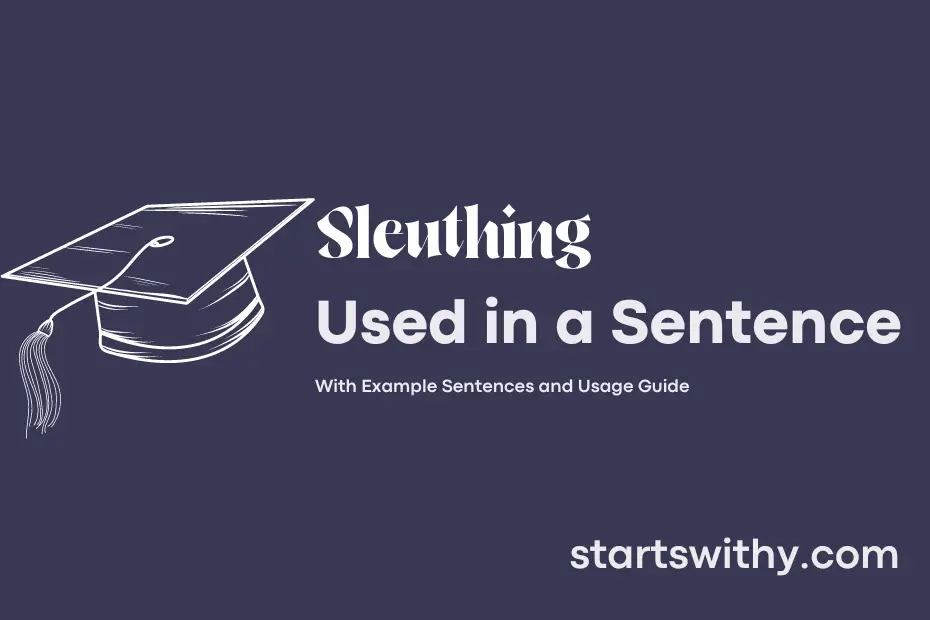Are you curious about the art of sleuthing in language? Sleuthing, often associated with detective work, refers to the act of investigating or scrutinizing details to uncover information or solve a mystery. In the realm of language, sleuthing involves carefully analyzing words, phrases, or grammar structures to understand their meaning or function.
By honing your sleuthing skills, you can unlock the hidden nuances and secrets within the language. Whether decoding unfamiliar vocabulary, unraveling complex syntax, or dissecting subtle word choices, sleuthing in language allows you to delve deeper into the intricacies of communication. So, if you’re ready to embark on a linguistic adventure filled with exploration and discovery, sharpen your sleuthing abilities to uncover the mysteries that language conceals.
7 Examples Of Sleuthing Used In a Sentence For Kids
- Sleuthing is like being a detective and solving mysteries.
- We can pretend to be detectives by sleuthing around the house.
- Let’s use our magnifying glass for some fun sleuthing.
- I love sleuthing with my friends to find hidden treasures.
- Sleuthing requires us to be very observant and look for clues.
- We can go sleuthing in the garden to see what we can discover.
- The best part of sleuthing is solving puzzles and cracking codes.
14 Sentences with Sleuthing Examples
- Sleuthing around the campus to find the best spot to study in peace.
- Trying some sleuthing skills to track down the professor’s office hours for extra help.
- Engaging in some sleuthing to find affordable food options near the college.
- Sleuthing through old textbooks to find helpful information for upcoming exams.
- Utilizing sleuthing techniques to uncover the best study groups on campus.
- Performing some sleuthing to discover the hidden gems of the college library.
- Employing sleuthing strategies to investigate the different clubs and organizations available on campus.
- Embarking on some sleuthing adventures to uncover the best study spots off-campus.
- Utilizing sleuthing skills to uncover the cheapest printing services in the area.
- Collaborating with classmates to do some sleuthing and find the best deals on textbooks.
- Sleuthing through college events calendar to find exciting extracurricular activities.
- Employing sleuthing techniques to uncover the most effective study methods.
- Enlisting the help of friends for some sleuthing to discover the easiest professors to approach for help.
- Channeling your inner sleuthing skills to track down lost items on the bustling college campus.
How To Use Sleuthing in Sentences?
To effectively sleuth in a sentence, start by carefully reading the text and identifying any clues or hints that can help you uncover the meaning or intention behind the words. Pay close attention to keywords, tone, and context to piece together the message being conveyed.
Next, analyze the structure and syntax of the sentence to determine how different elements are connected and what role they play in the overall meaning. Look for patterns, repetitions, and contrasts that can provide further insight into the author’s intent.
It’s also important to consider the broader context in which the sentence appears, such as the surrounding paragraphs or the overall theme of the text. This can help you interpret the sentence more accurately and make connections to other parts of the writing.
Finally, don’t be afraid to ask questions or seek clarification if something is unclear. Discussing the sentence with others or researching additional information can often shed light on the meaning and help you reach a deeper understanding.
By following these steps and approaching each sentence with a curious and analytical mindset, you can improve your sleuthing skills and become more adept at unraveling the complexities of language.
Conclusion
In conclusion, the art of sleuthing involves carefully investigating and analyzing information to uncover hidden truths or solve mysteries. Whether it’s Sherlock Holmes deductively solving crimes or a curious teenager sleuthing to find a lost pet, the act of sleuthing requires keen observation, critical thinking, and sometimes a bit of creative problem-solving. By piecing together clues, following leads, and asking insightful questions, a sleuth can unravel complex puzzles and uncover the truth behind mysteries.
Sleuthing isn’t just reserved for detective novels or movies; it’s a valuable skill that can be applied in various aspects of life, from solving personal dilemmas to untangling complex business problems. By honing our sleuthing abilities, we can enhance our problem-solving skills and become better equipped to navigate the challenges that come our way.



